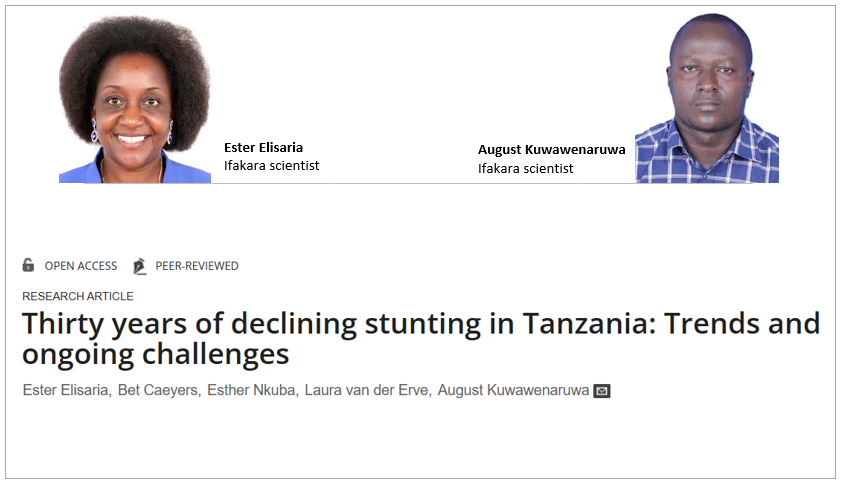
PROGRESS: New study shows fewer Tanzanian children are stunted — but gaps remain

Dar es Salaam, Tanzania – August 5, 2025
A milestone study by local and global experts
A new study led by Dr. Ester Elisaria and August Kuwawenaruwa, both from Ifakara Health Institute, sheds light on a health issue that affects the very start of life for many Tanzanian children: stunting.
They worked alongside Bet Caeyers (Chr. Michelsen Institute and Norwegian School of Economics), Esther Nkuba (Tanzania Food and Nutrition Center), and Laura van der Erve (Oxford Policy Management) to understand how stunting has changed across the country over the past three decades.
What is stunting — And why should you care?
Stunting means a child is too short for their age due to long-term poor nutrition, frequent illnesses, and poor care. But it’s not just about height. Stunted children are more likely to face learning difficulties, earn less in adulthood, and suffer from poor health throughout life.
This study followed over 42,000 children under five years old using national survey data from 1991 to 2022. The good news? Tanzania’s stunting rate dropped from 50% to 30% — showing clear progress. But that’s still 3 in 10 children who aren’t growing as they should.
Behind the numbers: What increases or reduces risk?
The researchers found that:
- Boys are more likely to be stunted than girls.
- Children born with low birth weight, from poorer households, or in areas with poor sanitation face higher risks.
- Better maternal education, wider birth spacing, and improved household income help protect children from stunting.
- Regions like Iringa, Njombe, and Ruvuma are still struggling with higher stunting rates.
Why this matters to you
Whether you’re a parent, health worker, policymaker, or farmer, this research matters. It shows that stunting is not just a health issue, but one tied to education, sanitation, gender equality, and income. And while progress has been made, there’s still much to do.
The researchers urge a broader effort: “We need more than just nutrition programs — we need to improve women’s economic power, family planning services, and water and sanitation.”
A call for collaboration
The study calls for multi-sectoral action — combining efforts in health, agriculture, education, and social welfare — to give every child in Tanzania a better start.
As Tanzania looks ahead to 2030, when the world hopes to cut stunting in half, this research offers a clear message: change is possible — but it must be intentional, inclusive, and equitable
Read the publication here.
